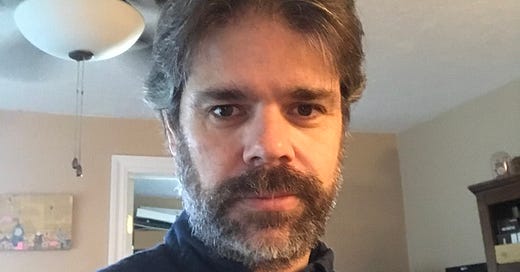John Cheever's "The Enormous Radio" is the story of Irene Westcott and her marriage to Jim. In the first of the story's four sections, which comprises half the story's total length, Cheever moves us from Irene and Jim's typical, settled life to just past the point of significant change. Crucially, from a narrative perspective, Cheever does not reveal the nature of the change, only that the couple's new radio is behaving strangely, broadcasting the lives of their neighbors through the speakers. Irene and Jim are not particularly interesting people. The opening descriptions paint them as respectably dull, born to and groomed for the middle class, middle-age, and middle management, as well as every other kind of scrupulous mean-ness one can imagine. Except for this: "The Westcotts differed from their friends, their classmates, and their neighbors only in an interest they shared in serious music. They went to a great many concerts—although they seldom mentioned this to anyone—and they spent a good deal of time listening to music on the radio."
Cheever ends the first paragraph with these two sentences. They serve as a kind of thesis the rest of the story will test, and plants the seed of trouble that will grow as the narrative advances. It's therefore worth looking carefully at what's built in to these sentences.
First, it's made clear that what follows with the radio is an anomaly. Jim and Irene, after all, differ from others only in their interest in music. Cheever gets low marks for subtlety, but goes to the top of the class for dramatic positioning. These ordinary people have just one unique thing about them and the story's going to leverage it. The hyperbole also adds to the fable-like quality of the opening. Though the setting is socially realistic, the conflict itself, and the tone of the third-person narrator, leans toward the fantastic.
The Westcotts differ in that they enjoy "serious music." I've remembered that exact phrase for eighteen years, ever since I first read "The Enormous Radio" in graduate school. The phrase "serious music" subtly turns the small difference between the Westcotts and others into a gaping chasm by introducing snobbery. The interests of their friends, classmates, and neighbors, while they certainly have a right to them, are by comparison frivolous. The word "serious" moves the narrator from an exterior observation into the the minds of the characters, showing us what Jim and Irene really think of themselves in relation to others.
Although Jim and Irene go to a lot of concerts, they seldom mention it to anyone, the narrator tells us. Their interest in serious music is an open secret. They do not guard their interest from others, but they do not share it either, except with each other. In addition to concerts, they spend their leisure listing to music on the radio. The last phrase brings us back to the radio. The last word of the sentence, combined with the title, points us toward the centrality of the radio to this story.
Cheever moves immediately into telling the story of the radio. In the second paragraph of "The Enormous Radio," the old radio is described, stops working, and a new radio is mentioned but not revealed. Jim's bought the radio as a surprise for Irene. Narratively, the surprise offers us a miniature cliffhanger, a micro-moment of suspense to launch this story within a story. In the next several paragraphs, Cheever describes the new radio. It's hulking, heavy, ugly. It clashes in Irene's composed living room. The new radio is complex to operate compared to the old radio, which would respond to a whack. There's also something wrong with the new radio: it's picking up interference. An attempt to fix the radio refines the nature of the interference rather than eliminating it. Instead of buzzing, the radio now tunes in to the action happening in other apartments.
The revelation of this fact, fundamental to the story, unfurls slowly. At first, Irene's baffled by what she's hearing. She refuses to believe the first inklings of what might be going on, but gradually comes around. Irene posits her theory to Jim, who also refuses to believe. As the evidence mounts, both characters come to recognize that their new radio is eavesdropping on others, but Cheever's careful to keep the recognition coming in snippets, delivered in dialogue exchanges as well as narrative passages that operate on different registers. Although the action is a straight line, the prose itself makes certain to build the shape of a story.
In the last paragraph before the first section break, halfway through the story, Irene's experiencing a complex range of emotions in response to the radio. She takes perverse pleasure in overhearing the neighbors' intimacies. She goes to bed "weak with laughter," but later, "the restrained melancholy of the dialogue...made her shiver." Through Irene's reactions, we're shown that what's happening is wonderful and awful, entertaining and destructive, both in Irene's power to control yet ripe with temptation and highly addictive. We reach the white space at the end of the paragraph shivering too.
In these last few paragraphs before the break, Cheever completes the radio's story within a story arc and brings the focus back to Irene and Jim, the subjects of the opening paragraph. Because of what's happening, the novelty and surrealism of the radio's eavesdropping, Irene no longer seems dull and ordinary. She's been listening to the radio, as stated in the opening, but she has not listened to music. Music, in fact, never plays on the radio, unless it's being played in a neighboring apartment. The "serious" interest Jim and Irene shared has been usurped completely by chance, via a malfunction, and through an irresistible curiosity about the secrets shared between other couples.
In next week’s edition of John Carr Walker Sitting In His Little Room, we’ll read through the second half of John Cheever’s story “The Enormous Radio.”


